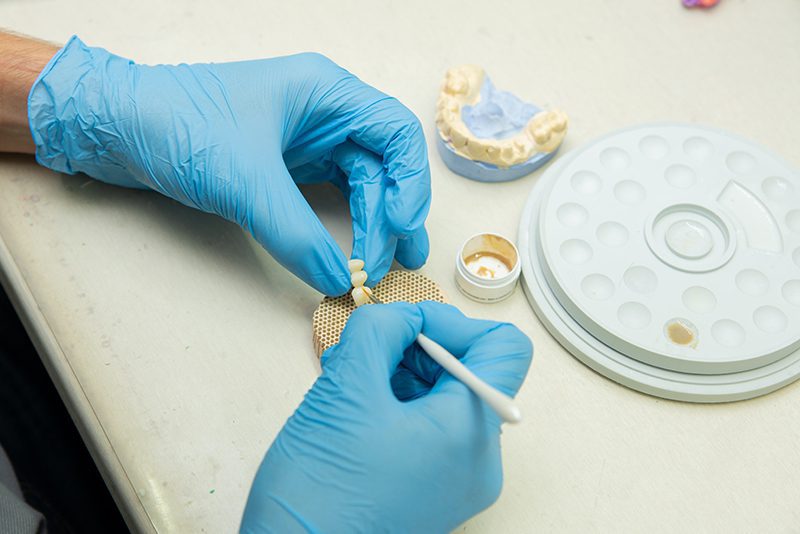If you’re looking to correct your missing teeth, two main options are available to you: dental implants and partial dentures. These options are very popular and have been standard dental procedures for years. A dental surgeon may recommend either of these dental procedures based on your needs. In determining which option is best suited for your unique situation, it’s a good idea to know the difference between the two.
Today Advanced Indiana will be exploring those differences. We’ll discuss what’s involved in each procedure to help you make an informed and educated decision when it comes to your dental health. Regardless of which option you choose, however, you should know that both implants and dentures will help improve the look and function of your teeth.
What Are Dental Implants?
Essentially, a dental implant is an artificial tooth root implanted to replace a missing natural tooth. Resembling a titanium screw, the implant is inserted either into the gum or the jawbone, depending on which procedure is used. When the dental implant is affixed to the gum, this is known as a subperiosteal implant. When the dental implant is inserted into the jawbone, we call this an endosteal implant.
After the gum heals following a subperiosteal implant, your dentist will place the connector rods, also known as abutments, positioned on top of the implant post. These rods have multiple functions, including keeping the posts in place and providing adequate support for the porcelain crown. In total, the average time it takes to complete the dental implant procedure is between 6 and 9 months. The amount of time the process takes also depends primarily on whether or not bone grafting will be required to strengthen the jawbone to hold the artificial tooth firmly in place.
The Benefits of Dental Implants
There are many benefits to dental implants. Not only will you enjoy renewed self-confidence and a smile you can be proud of, but you’ll also be able to get back to enjoying life as before. Here are a few of the benefits you can expect from dental implants:
- Implants are permanent replacements for missing natural teeth.
- The replacement teeth look and function just like natural teeth.
- You can eat, chew, and speak properly with dental implants.
- Dental implants eliminate tongue thrusting, as it typically occurs in the case of missing front teeth.
- Dental implants are cared for in the same way as natural teeth with plenty of brushing and flossing.
- Dental implants can help prevent the loss of more natural teeth as they strengthen the jawbone and reduce future jawbone loss.
What Are Partial Dentures?
Partial dentures, unlike dental implants, are a form of removable tooth replacement. The denture itself is designed to look as natural as possible compared to your original teeth. Dentures are attached to a plastic base that is colored to resemble gums before being connected by a metal framework. This metal framework is then attached to the adjacent teeth to securely hold the mechanism in place.
While partial dentures allow you to replace one or more missing teeth, much like dental implants, they are typically much cheaper. Additionally, the process of receiving partial dentures is short as compared to the many months that a dental implant procedure can take. Typically, partial dentures cost between $2,000 and $4,000, while the cost of a single dental implant can be upwards of $3,500 for a single implant. When choosing between the two as a tooth-replacement treatment, this is something to consider. Still, dental implants may be a better option for you in the long run if you can afford the initial investment.
The Benefits of Partial Dentures
Like dental implants, partial dentures come with their fair share of benefits. Consider the following benefits as you work with your dentist to decide between dental implants and partial dentures:
- Partial dentures are a less invasive option.
- Partial dentures are typically more affordable than dental implants.
- Additional teeth can be added to partial dentures depending on the material used, among other factors.
- Partial dentures are usually easier to get used to than complete dentures.
Find the Right Option For You at Advanced Indiana!
Now that you know the difference between dental implants and partial dentures, you have the information you need to make the best decision for you. Still, we highly recommend working closely with your local dentist to determine the best treatment option for your unique needs. That’s where an experienced dentist’s office like Advanced Indiana comes in!
At Advanced Indiana, we specialize in many general, cosmetic, restorative, and comfort dentistry procedures. No matter your needs, we have the solution you are looking for! We know how important it is to have a smile you’re proud to show off, and we’ll stop at nothing to ensure you experience this. Your health is our number one concern, and we’ll work tirelessly with you to find the best treatment option available.
Contact us today or request an appointment online to get started!
Photo by Ivan Babydov from Pexels

